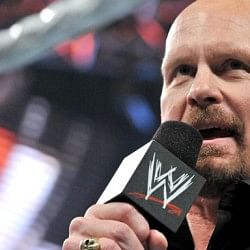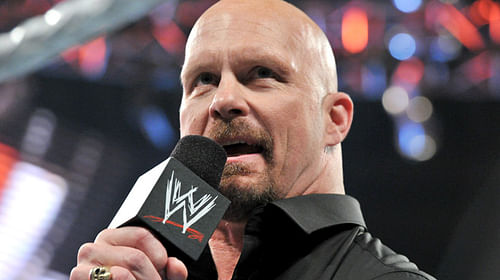
Pro Wrestling: Paying the dues
“We were driving from Nashville to Memphis and Memphis and back, about a 400 mile round trip, making 15 dollars to do that. So the two guys rode with me would just gas up my base model Hyundai Excel, which my brother had co-signed the note for me, payments were 154 bucks a month. I could barely make those damn payments. So guys were chasing me around, trying to collect my car. So times were rough, but that’s part of paying the dues process. On Wednesdays we used to always get paid in Evansville, Indiana, and with the little s****y paychecks we were getting, we’d go down to the liquor store in Evansville to buy our beer before we headed home. This was back when it was okay to drink and drive, before everyone started screwing it up. So we’d cash our checks and we’d tell the guy behind the counter there, yeah these are just our trans checks for gas and horse****. But these were the checks we were living on.” – Steve Austin

If you’d ask a young fan what he likes in the shaded world of professional wrestling, he’d tell you about the action or how the guys never back down, or how they’re entertaining. There are other sets of people who’d tell you that they got into professional wrestling, or only the WWE because of guys like John Cena or Randy Orton. As much as you ask the others, you find the answers polarizing. In fact, most of the people don’t even know why they like professional wrestling. It might be because of the antics, or the completely new, bizarre and goofy world of professional wrestling. How many of the young kids tune in every week just to cheer Cena on? How many tune in just to see Sheamus or Randy Orton? The answer is almost half of the WWE fan base.
But when you ask a traditional fan, traditional in the sense, someone who’s an ardent follower, someone who knows the in and out of pro wrestling, someone who’s a pure wrestling fan, their answer will be completely different. He/she might talk about the art and the craft, the way someone hones their skill, like a fine craftsman; something like a potter who worked on so many models, and finally when he caresses the silken pot, he knows he finally has ‘it’. When you see people bettering their skills, and when everything falls into place, and when everything they do in the ring has a certain flow to it, it becomes a treat to watch. Professional wrestling too, is something similar. But that answer comes from very few people.
Back in the 70s, when professional wrestling was slowly creeping into every home, on the weekends, the fathers used to take their sons out on a 3 hour drive, just to take them to a stadium where 2 guys were brawling under the lights. This was the time when professional wrestling was also called as ‘The Circus’, as they used to drive into every city, stay and perform for a couple of nights, and move on to the next city. Many younger fans were intrigued by this ‘sport’, which saw two grown men fighting, rather ‘wrestling’ in a squared ring. It was the ultimate show of strength and tenacity, and the will to win. After you attend several shows, you’d get hooked by professional wrestling. Then you know you were in love with something that was between two worlds, and that was the best part.
Back in the olden days, you couldn’t just walk up to a promoter or a booker and ask him to get you a spot on the card. There were many people vying for one spot on the card. Wrestling wasn’t a high paying career back then. Out of 50, about 3 would make it, and about one of the 3 would make it big. But it used to take years for someone to ‘make it big’. You talk about Flairs and Gorgeous Georges, and they didn’t make it big over night. This is the concept that used to hold true in wrestling. Unless you work your way up, and unless you respect the business, and give to the business, you wouldn’t succeed. This is what used to be called ‘paying your dues’. It also came with a notion that you had to gain respect from your peers, and that was never an easy thing to do.
The prime example is of Chris Benoit. Benoit had to toil for nearly 2 decades, and travel all over the world honing his craft. He started at the Canadian Stampede, then went to Japan and worked as the Wild Pegasus, before gaining respect in the wrestling circuit as one of the best technical wrestlers in the history of the business. Then he came back into the United States and worked for ECW and WCW. After nearly 2 decades of dedication and hardwork, Chris Benoit finally became the World Champion at WrestleMania in the WWE. This is the kind of story you look at, when you say ‘paying your dues’. Most people from the current crop do not understand this, as it has become a forgotten word.
“It’s a long road of paying your dues. I mean, each and every person that’s in this business has to go down that road. Some people may not have to. Some people may be given that road instantly because of who they are. For those who are acting like (look at the) sweat, blood and tears to get there man … when you get there man, it’s not nowhere near over yet.” – R – Truth
There used to be a time when working 3 shows wouldn’t get you enough money to pay your cable bill or your car rent. Professional wrestling has never been an easy business to survive in, which makes those who get into big companies that much impressive. And when you reach a spot on the card where you’re above the others, you decide to hold them down, because you do not want to lose your spot. In the end, pro wrestling business is as vicious and cut throat as any other business in the world. If you make money, and if people are interested in you, then everything works fine. But if they’re not, you’d be unemployed the very next day.
Knowing all of that, for decades people have given their everything for the business. When you talk about Jake Roberts or Von Erichs, they had dedicated their lives to the business, so much so that they had forgotten about their own. A guy like Austin had to scrape his way through the others, and with a bit of luck, he struck gold, but not before he did everything he could. It is not often that hard work pays in the end, but when it does, all the effort’s worth it. But in today’s world, you do not have to pay your dues. There are a lot of guys in the back who do not know the meaning of psychology, or how to work a match, or look to gain respect in the business. In the end, all the ‘blood, sweat and tears’ stories in professional wrestling have come to an end. The term ‘respect’ in the business isn’t easily thrown around, but one has to wonder; other than the Undertakers, Bryans and Samoa Joes, does anyone in the business deserve to be given that respect? Or is it just the old school mentality that glorifies just another entertainment entity?